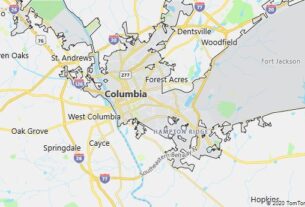North Carolina is located in the southeastern United States. It borders on the Atlantic and is one of the so-called southern states of the USA. With an area of 139,389 km², North Carolina is the 28th most extensive and the 9th most populous of the 50 United States.
On November 21, 1789, North Carolina became the 12th state of the United States of America. Capital of North Carolina is Raleigh, but it is not the largest city in the state, that is Charlotte with its many attractions. Today North Carolina is a popular travel destination with the Great Smoky Mountains National Park, beautiful nature and many interesting sights.
North Carolina ‘s motto is “Esse quam videri” – to be more than to appear. It also has the nicknames “The Old North State” and ” Tar Heel State ” – Old North State or State of the Tar Heels, which is probably where the name of the residents “Tar Heels” comes from.
Over the past five decades, North Carolina grew from tobacco, textiles and furniture manufacturing into an even stronger economy with engineering, energy, biotechnology and a large financial sector.
This state is particularly known for Mount Mitchell at 2037 meters (6684 feet), the highest point in North America east of the Mississippi River and also the highest mountain in the Appalachian Mountains. Georgia and South Carolina are bordered by North Carolina to the south, Tennessee to the west, Virginia to the north, and the Atlantic Ocean to the east.
Famous North Carolina figures include James Knox Polk, who was the eleventh President of the United States from March 4, 1845 to March 4, 1849, and actress Ava Gardner. Edward Snowden was also born in Elizabeth City.
Climate in North Carolina
Most of the state has a warm temperate rainy climate. Excludes the higher elevations in the Appalachian Mountains, which are part of the fully humid boreal climate zone. The mountains often serve as the Piedmont’s “shield,” keeping low temperatures and storms out of the Midwest. The average daily temperature in most areas of the state is around 32°C in July. In January, the average temperature is 10 °C.
The climate in the coastal plain is influenced by the Atlantic Ocean, resulting in mild winters and moderately warm summers.
On average, a hurricane hits the state once every decade. Tropical storms occur every 3 or 4 years. Only Florida, Texas, and Louisiana are more frequently affected by hurricanes than North Carolina.
North Carolina attractions
North Carolina is popular for its scenic beauty, with its coastal plains on the Atlantic, the Piedmont Plateau in the hinterland, and the mountainous Appalachian Mountains. In the larger cities like Charlotte there is the NASCAR Hall of Fame, the Billy Graham Library or the North Carolina Museum of Art in Raleigh to visit.
UNESCO world heritage
North Carolina is home to the UNESCO World Heritage Great Smoky Mountains National Park, the park is located in the Appalachian Mountains in the states of North Carolina and Tennessee.
National Park in North Carolina
Great Smoky Mountains National Park
Cities and places of interest in North Carolina
Raleigh
Asheville
Chapel Hill
Charlotte
Durham
New Bern
Universities & Colleges in North Carolina
University of North Carolina at Chapel Hill
Duke University in Durham
North Carolina State University in Raleigh
Shaw University in Raleigh
Airports in North Carolina
Douglas International Airport in Charlotte
Raleigh-Durham International Airport in Raleigh and Durham
Piedmont Triad International Airport in Greensboro, Winston-Salem and High Point
Wilmington International Airport in Wilmington
Asheville Regional Airport in Asheville
Pitt-Greenville Airport in Greenville
Fayetteville Regional Airport in Fayetteville
Craven County Regional Airport in New Bern
Rivers & Lakes in North Carolina
Roanoke River
Yadkin River
Pee Dee River
Cape Fear River
Neuse River
North Carolina mountains
Appalachian Mountains
Mount Mitchell
Clingman’s Dome



